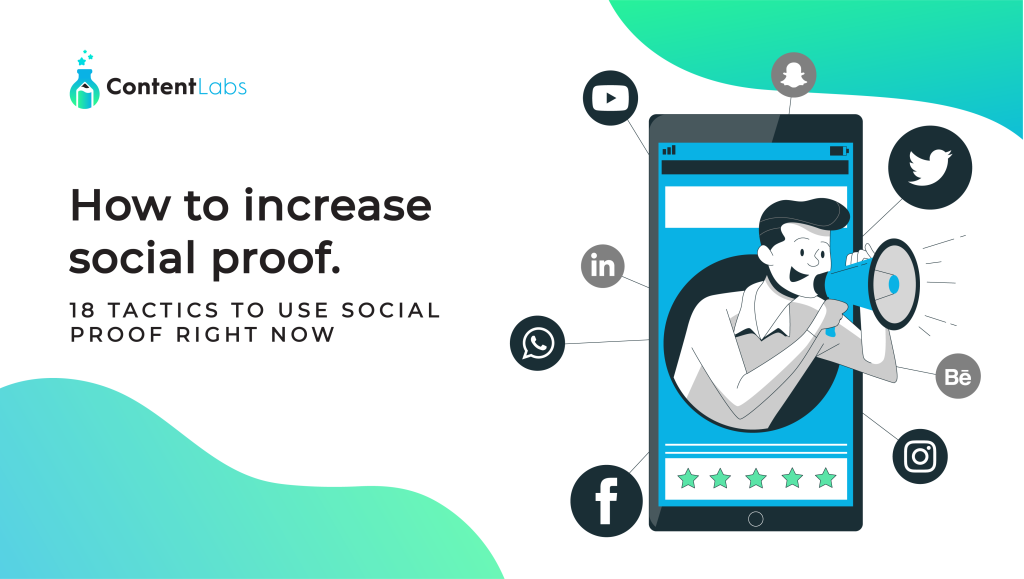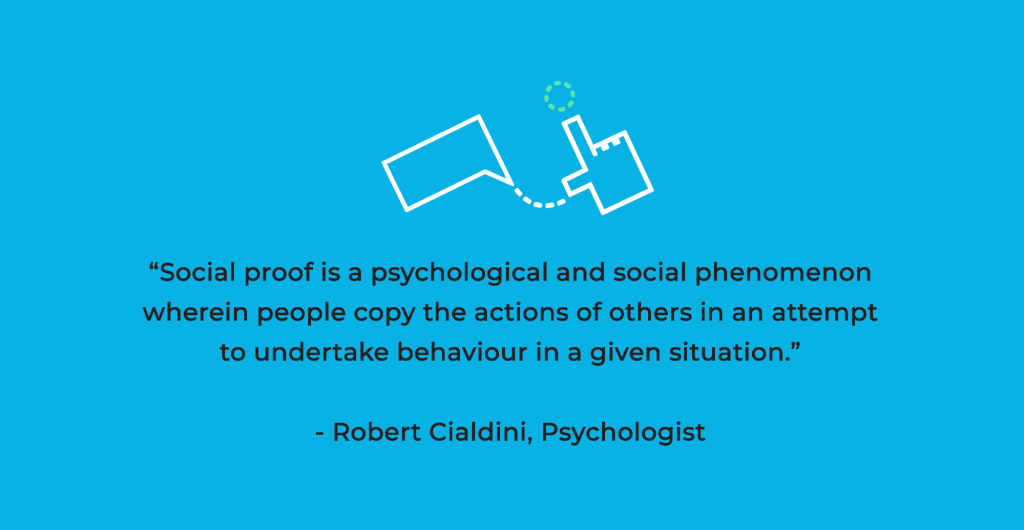Ever purchased a product or service based on a friend’s recommendation?
Then you’re already familiar with the awesome power of social proof.
Social proof can be an extremely powerful tool to utilise in your marketing, enabling you to enhance brand credibility and increase conversions.
And the best part? Using social proof is incredibly simple.
There are plenty of different ways for you to incorporate these strategies into your ad campaigns, website design and social media platforms.
Let’s take a look at the social proof definition, the undeniable benefits of using social proof, and 18 different tactics that you can deploy immediately to increase your e-commerce conversions.

What is social proof, and why is it important?
The term ‘social proof’ was coined by American psychologist and academic Robert Cialdini.
So what exactly does it mean?
Here’s the technical definition:

Social proof definition: “Social proof is a psychological and social phenomenon wherein people copy the actions of others in an attempt to undertake behaviour in a given situation.” – Robert Cialdini
Sounds intriguing, right? But what does social proof mean for e-commerce marketers, and how do you use social proof in marketing?
It all comes down to persuasion.
Social proof is all about convincing customers to take an action (e.g. a sale, a subscription, a download) by presenting them with evidence of your brand quality and reliability.
Source: missionbeard.com
Types of social proof
Social proof can be captured, created and distributed in many forms. It’s highly versatile.
Below are a few examples of the different types of social proof:
- Case studies
- User testimonials
- Product reviews
- Social media posts
- Trust icons and badges
- Data and statistics
- Celebrity endorsements
- Press mentions
- Review sites
- Expert approval/recommendations
- Personal recommendations
- Awards and accolades
- Influencer content
As you can see, you’re spoiled for choice when it comes to sourcing different types of social proof. There are mountains of valuable content out there.
But all of these examples have one thing in common.
They can all be utilised to develop your customer relationships, enhance the reputation of your business and ramp up your conversions.
How can social proof increase my conversions?
Social proof ultimately helps your business to build trust, credibility and authenticity.
All of these factors are key to convincing prospects to make a purchase.
For example, let’s say that you’re running an online clothing business.
A potential customer is searching for a new jumper, and they’ve narrowed their search down. It’s between you and one other competitor.
Your products are similar, and they’re listed at the same price. It’s a tough call.
But wait – your website is packed with compelling examples of social proof.
The customer notices that your jumpers are receiving bundles of positive reviews. Plus, they can see Instagram posts from recent buyers enjoying their new purchases.
Now the choice is a no-brainer, and you have a new customer.
They instantly trust the quality of your products, and they commit to a purchase. That’s the almighty power of social proof.
Let’s run through 18 social proof strategies that can help your business to build customer relationships, secure conversions and increase revenue.
1. Run micro-influencer marketing
Influencer marketing is one of the most common forms of social proof in digital marketing.
And it makes complete sense.
Influencers have a lot of credibility with their followers. If they promote or endorse your brand online, this can be a very persuasive form of social proof.
But big-time global influencer campaigns can cost an eye-watering amount.
That’s where micro-influencers come into play.
Micro-influencers are individuals with a slightly smaller audience (i.e. between 1,000-10,000 followers) who often specialise in advertising specific categories – for example, fitness or fashion.
These influencers are more affordable for e-commerce brands and can deliver fantastic results through social proof. For example, sponsored posts or product tutorials.
To get started with micro-influencer marketing you can reach out to individuals directly, or enlist the help of an influencer marketing agency. An agency can help you to find the perfect influencers for your brand, so this can be a smart move for your first campaign.
(Source: SocialMediaStrategiesSummit)
2. Incentivise and utilise UGC as social proof
UGC (User Generated Content) is a super-effective type of social proof.
Firstly, it’s created by your customers. There’s no heavy lifting required from your side. You just need to collect positive online reviews and glowing customer testimonials.
Secondly, it’s very persuasive for new buyers. Seeing happy customers enjoying their products is a powerful motivator for a new purchase, and UGC can build a buzz around your business.
How do you collect UGC?
Well, you can find UGC in the wild. It’s everywhere.
Browse social media for positive comments about your products, check relevant hashtags, hunt for complimentary reviews online – you’ll likely find some valuable UGC floating around.
However, if you really want to ramp up your UGC efforts, you can start to incentivise your customers.
You might offer a free gift to customers who post a Twitter hashtag, or a future discount in exchange for a five-star rating. Whatever the deal, you can rapidly increase the amount of UGC being generated.
Once you’ve got access to a mountain of UGC, it’s time to start putting it to good use.
The possibilities are almost endless for UGC marketing. You can include customer comments in adverts, incorporate positive reviews into your website, and even drop positive feedback into email newsletters.
(Source: RafflePress)
3. Actively recognise awards or brand mentions
Receiving some well-deserved industry praise?
Seeing your brand name popping up in blog posts?
This is a golden opportunity to collect some cracking social proof.
If your business has been given an award or mentioned in an industry publication, don’t be afraid to showcase it. There’s no need to be shy!
(Source: WalkMe)
Being recognised as a quality brand by a third party is excellent for your reputation.
When your customers see that you’ve been acknowledged for your top-notch services, they’re infinitely more likely to trust your brand and buy your products.
Don’t hesitate to highlight these endorsements on your blog, within your campaigns, or through a social media platform. Wherever your customers will be able to see your latest achievements, this form of social proof will work wonders.
Keep your eyes peeled for any mentions in industry articles, blogs or columns.
4. Share key business milestones
Nobody likes a show-off, but in the world of social proof, there’s nothing wrong with a little humble-brag.
Sharing business milestones or achievements is an excellent way to enhance your reputation and gain the trust of potential customers.
Sent out your first 1,000 orders? Let your Twitter followers know.
Received your 100th five-star review? Shout about it on your Facebook page.
These milestones signal that your business is successful, which instantly suggests that your products are worth buying.
If prospects see that you’re smashing your targets, they’re more likely to convert. Think about some key milestones that you’d like to share with your audience, and make sure to post whenever you hit these goals.
Check out how Forge and Smith use this form of social proof on their site:
(Source: ForgeAndSmith)
5. Interact regularly with satisfied customers
If you’re receiving feedback from happy customers online, it’s important to respond and acknowledge this praise.
Sometimes social proof is a two-way street, and you’ll need to actively encourage interactions to spread the message. Plus, it’s only polite.
Not only do these interactions help to nurture strong customer relationships, but they also send a clear signal to other prospects.
It could be a simple Retweet or a quick reply to a social media comment.
If users see your brand interacting with satisfied customers, they’ll realise two things. Your business cares about customer feedback, and your products are worth purchasing.
Check out the expert social proof ASOS is rocking on their Twitter feed:
(Source: Reviews)
6. Proudly display glowing reviews as social proof
Positive reviews are one of the simplest and most effective forms of social proof available.
A good review can say a lot about your business, highlighting different areas of your offering – from customer service to delivery timings and product quality.
You can easily source review content from several places.
Websites like Google and Yelp are popular for customer reviews, but you might also offer a space for reviews on your product pages. Keep an eye on these resources to regularly collect new feedback.
Display strong reviews clearly on your website and social profiles. The more prominent they are, the more likely they are to persuade new customers.
Here’s a great example of social proof in action:
(Source: NextSale)
7. Make the most of trust badges
Trust badges are like mini-endorsements for your business and are a social proof example that can work wonders for your conversion rates.
These badges are usually placed throughout your website and around the checkout, and can include:
- A safe & secure checkout badge (also known as an SSL certificate)
- Free shipping and free returns badges
- Accepted payment method badges
- Third-party badges (e.g. Google verified, Amazon bestseller)
- Money-back guarantee badges
Trust badges are simple additions to your landing page, but these little pieces of social proof can do a lot for your online sales. Trust is a huge part of a successful e-commerce store, particularly when you’re trying to convert new customers.
If customers feel safe and secure with your website, they’re far more likely to commit to a purchase.
(Source: Kinsta)
8. Create compelling case studies
You don’t always need to gather social proof from external sources.
Sometimes you can take the initiative and create your own content.
Case studies are an exceptionally effective way to showcase the benefits and strengths of your business offering.
You can work with copywriters and graphic designers to create eye-catching stories, but it’s the results that matter most.
Whether you’re selling physical goods or services, you just need to highlight how customers have benefited from your products. There’s something incredibly persuasive about case studies that can help to increase your conversions and attract more shoppers.
Try and use hard numbers and statistics where possible (i.e. a percentage sales uplift) to make your case studies more effective.
Promote these case studies through paid and organic channels, and you’ll inevitably grab the attention of potential customers.
Check out how BuzzSumo uses success stories as positive social proof to build trust with their target audience:
(Source: BuzzSumo)
9. Encourage social sharing
Social media is the ideal environment for nurturing and distributing social proof.
And your followers are the best ambassadors for your brand.
If one of your loyal customers decides to share content from your social media page, you’ve instantly gained exposure to their online following.
If this happens regularly, you’ll quickly see your organic reach expanding and your sales rising.
Some social sharing will occur naturally if you’re posting quality content, but it’s never a bad idea to encourage more of it.
Setting up competitions or promotions is a brilliant way to nudge your followers and increase organic shares. You might offer a discount to followers who share a post or tag their friends.
The more users see your brand content shared by friends, the higher the social proof, and the more likely they are to trust your reputation. And that equals conversions.
(Source: HubSpot)
10. Gain celebrity social proof by connecting with industry experts
Let’s say that you’re incredibly close to converting a brand new customer on your website.
By giving a platform to industry experts and thought leaders, you immediately boost the credibility of your business. And celebrity social proof can be extraordinarily powerful.
You might invite a well-known industry figure to a live Q&A, publish article content on your website, or even just share an expert seal of approval.
This doesn’t need to be a global megastar or celebrity. Just someone who can bring some relevant insights to the table and easily create interesting content for your customers.
Associating your brand with a respected expert is an excellent way to create persuasive social proof, and immediately elevates the status of your business.
This will position your brand as an authority in the market, which will help your conversions to grow.
(Source: CXL)
11. Use up-selling and cross-selling tactics
They’re hovering over your products and browsing your pages, but they’re not quite ready to hit that ‘checkout’ button and part with their cash.
What can you do?
Up-selling and cross-selling tactics often include a strong element of social proof that can make the difference between an abandoned browser and a completed purchase.
A ‘Best Seller’ badge placed on a product instantly increases its appeal because it suggests that many other satisfied customers have purchased it.
The same thing applies to ‘Customers Also Bought’ labels, which help you to cross-sell different products by implying that previous shoppers have also enjoyed them.
These strategies can make an enormous difference to your conversion rates through subtle (but effective) social proof signals.
Amazon uses this social proof tactic expertly on their product pages by displaying best-seller ranks, no doubt increasing their conversion rate and driving more sales.
(Source: MagePlaza)
12. Nudge your customers to spread word-of-mouth recommendations
Word-of-mouth recommendations can be hugely influential among potential customers.
The power of social influence is based in trust and authenticity, and it doesn’t get much more trustworthy than friends and family.
However, it’s not always easy to increase word-of-mouth endorsements. They tend to occur naturally, which is partly why they’re so persuasive.
But don’t lose hope.
You can put your business in the best position possible to generate organic recommendations among your audience.
The first thing to focus on is delivering superior products and services. Unsurprisingly, this is the most effective way to drum up word-of-mouth.
Features like responsive customer service, speedy delivery times and high-quality products tend to encourage a positive review among shoppers.
However, you can also actively nudge your customers to spread the word about your business.
A helpful ‘tell your friends’ reminder in an order confirmation email or social post can get the ball rolling, but try to avoid pushing too aggressively.
13. Show off your customer base
Showcasing your previous and current clients is a great way to make a positive first impression on prospects.
Displaying customer logos clearly on your landing page helps to instantly boost your reptuation and reinforce your credentials.
It proves that you’re an established business, and confirms that other clients have already trusted your services and expertise. And if it was good enough for previous customers, it must be good enough for new ones!
You could also display logos or brand names on your social media profiles, or even within your email signature. Basically, anywhere that your customers can see them.
Check out how MailChimp reference established client relationships to build social proof:
(Source: MailChimp)
14. Use real-time statistics and data to drive FOMO
We already know that social proof is a potent motivator for new customers.
We also know that creating a sense of urgency can help to improve conversions.
So what happens when you combine the two? Certified e-commerce magic.
Displaying real-time statistics on your website is a smart way to capitalise on FOMO while also leaning on the power of social proof.
Data points like ‘X customers are currently viewing this item’ or ‘X shoppers have purchased in the last 24 hours’ can help to build urgency among shoppers and increase sales.
Plus, these engaging statistics show that your store is immensely popular and brimming with real customers. That’s expert social proof.
Here’s an example from Shopify demonstrating real-time statistics in action:
(Source: Shopify)
15. Display any handy platform integrations
If your product or service integrates with third-party platforms, why not shout about it?
Showcasing your integrations is a brilliant way to build trust with new customers, while also emphasising the accessibility and convenience of your product.
Not only that, but you also tap into the credibility of your integration partners, further enhancing your own reputation. It’s a win win.
All you need to do is clearly display the names and logos of partners that you currently integrate with, and let the social proof work its magic.
Monday displays its extensive platform integrations in a highly visual, impactful way:
(Source: Monday)
16. Showcase customer and subscriber counts
Here’s another solid example of simple data being used to create super effective social proof.
Visualising the total number of your existing customers, followers or subscribers is a handy shortcut to establishing your business credentials.
If prospects see that you’ve already built a sizable customer base, they’ll feel more confident trusting your brand and purchasing your products – because many others already have.
(In other words, the term ‘safety in numbers’ still very much applies to e-commerce shopping.)
You can share these customer statistics on your website, through social media posts, or within email communications. It’s a simple number, but it can have a big impact on sales.
WordPress exhibits its audience size in a creative way, displaying social proof to increase trust and reiterate the quality of its services:
(Source: WordPress)
17. Advertise third-party endorsements
Social proof can be harvested from many different places, but some of the most persuasive content comes from third party sources.
Why?
Because it’s easy for a business to boast about their own statistics or testimonials – but receiving approval from an external partner is far more compelling.
For example, the Google Shopping Experience Scorecard providers Google sellers with transparent ratings for metrics like shipping speed, delivery costs, and return windows.
E-commerce businesses who receive positive ratings from third parties like Google are more likely to be trusted by new customers.
Below is an example of a third-party endorsement badge from Google:
(Source: Google)
18. Run social media takeovers with influencers
Social media takeovers are effectively another form of influencer marketing, and can be extremely useful for brands looking to leverage social proof.
During a social media takeover you’ll allow an influencer or industry expert to post from your brand’s social channels for the day.
They might post new pieces of content, share product recommendations, or even just interact with your followers.
A social media takeover is a win-win situation.
The influencer can grow their reach and exposure to your audience, while your brand can benefit from associating with a trusted figure.
All you need to do is find an ideal candidate for your social channels who can also engage your audience.
Here’s a takeover example from Forbes, where an entrepreneur was connected directly with a business audience via Twitter:
(Source: Twitter)
Social proof is an extremely versatile tool for your e-commerce business.
It can be found in a variety of places online, and often requires minimal effort to harvest.
Plus, the more you utilise social proof, the more likely you are to generate it.
Social proof will increase conversions, which leads to more happy customers, which encourages more glowing reviews, which creates more social proof.
You get the idea.
Stay focused on consistently gathering and using social proof in your marketing strategy, and you’ll see a big impact on your conversion numbers.
Need high-quality content for your e-commerce business? Create your free account now.

